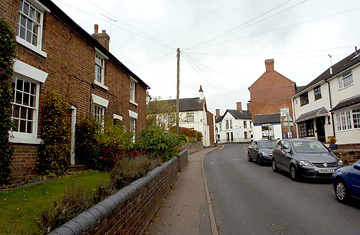
The village of Gnosall in South Staffordshire, England, Uk
When it is bathed in crisp sunlight, the village of Gnosall in England's West Midlands seems almost plucked from a Jane Austen novel. A neat cluster of tidy shops and well-kept brick homes, the community of 5,000 boasts an 11th century Anglican church and a grass-banked canal. Along the winding High Street, locals walk their dogs and motorists yield and wave. And quaint charm isn't the whole story. "It's a very modern, forward-thinking place," says ward council member James Kelly.
Yet Gnosall has been battered by tragedy, and, in recent weeks, wounded by the lurid press attention that so often attends it. One British tabloid dubbed it the "village of the doomed"; other accounts darkly suggested the community may be cursed. The reason: six village residents have committed suicide during the past 12 months, a staggering figure in a nation that averages fewer than nine suicides per 100,000 people. Dr. Hynek Pikhart, a professor of statistics and epidemiology at University College, London, estimates the chance of a community Gnosall's size enduring six suicides in a single year to be less than 0.001%. Perhaps the most unsettling aspect of this torrent of disaster is that nobody can pinpoint its root cause. "There are no demographic differences between Gnosall and the rest of England" that would explain the anomaly, Pikhart notes. "If anything, it is above average in terms of employment and other social indicators."
The suicides began last December, when postman Craig Parsons, 40, was found hanged. Four months later, lorry driver Peter Forrester, 35, died after overdosing on medication prescribed for his wife, who had recently died of a heart attack while playing badminton. Nigel Buckley-Robins, 50, succumbed to a deadly blend of painkillers and alcohol the following month. All three deaths were ruled suicides by South Staffordshire coroner Andrew Haigh.
Tragedy kept striking. In May 17-year-old Jessica Littleton was found hanged; Ian Gould, 75, died the same way in August. Late last month, Terry Ball, 35, was the sixth casualty. Official causes of death have not been recorded for Ball, Gould or Littleton, but there is little question that each was self-inflicted.
The mystifying spate of suicides has left Gnosall residents baffled and outsiders scrambling to assign blame. Some wonder whether residents are receiving appropriate psychological care. "Mental health services remain the Cinderella of the NHS," said Phil Waterson, chief executive of the local mental health charity Mind, referring to Britain's often reviled National Health Service. While Waterson says local mental health services are good, residents may be wary of seeking care, fearing their treatment might become a source of gossip. "I think there is a big reserve about coming forward and acknowledging you have mental health difficulties," says Dr. Abid Khan, clinical director of adult mental health services in South Staffordshire.
Troubled individuals may also have watched the mounting catastrophes garner attention and taken a cue. Like a sore throat, suicide can be contagious. "One suicide in a community can become a trigger for other people who are at risk," Waterson explains. Suicide clusters generally occur among teenagers and young adults, though patterns have been reported in groups of marine troops, religious sects and psychiatric inpatients. But the cases in Gnosall cover a broad age spectrum, and the deceased, by all accounts, were not close to one another. Khan points out that the suicide rate has fallen there in the past three years, and Kelly rejects the idea that this year's series has anything to do with the place itself. "They are individual cases. None of them are connected at all," he says. "You have a bit of a mystery, I'm afraid."
If a sort of contagious depression is to blame for the cluster of suicides, the attention Gnosall has received in the British press is unlikely to help. The community has been "very distressed" by the negative portrayals of Gnosall in the media, says Cynthia Spencer, 64, a clerk to the local parish council. But amidst their grief, villagers are trying to heal. In memory of two of its deceased who used to ride their horses there, the community has christened a local path as "Forresters Lane." As it meanders toward the local cricket club, the dirt track passes a children's playground and a small paddock. Horses grazed as darkness crept in, signaling the end of a bright day. Hopefully the storms have passed.
